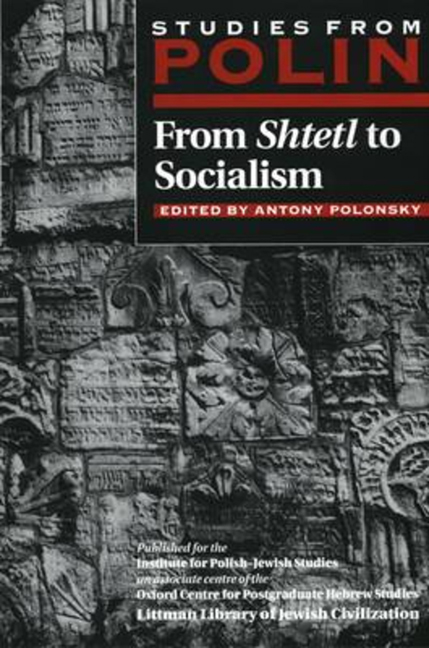Book contents
- Frontmatter
- Dedication
- Editors and Advisers
- Polin
- Polin: Studies in Polish Jewry
- Acknowledgements
- Contents
- List of Maps
- Introduction
- PART I PRE-PARTITION POLAND (to 1795)
- PART II THE NINETEENTH CENTURY
- PART III BETWEEN THE TWO WORLD WARS
- PART IV THE SECOND WORLD WAR
- PART V AFTER 1945
- 25 The Contexts of the So-Called Jewish Question in Poland after World War II
- 26 Is there a Jewish School of Polish Literature?
- 27 A Voice from the Diaspora: Julian Stryjkowski
- 28 Poles and Poland in I. B. Singer's Fiction
- Notes on Contributors
- Chronological Table
- Maps
- Glossary
- Index
26 - Is there a Jewish School of Polish Literature?
from PART V - AFTER 1945
- Frontmatter
- Dedication
- Editors and Advisers
- Polin
- Polin: Studies in Polish Jewry
- Acknowledgements
- Contents
- List of Maps
- Introduction
- PART I PRE-PARTITION POLAND (to 1795)
- PART II THE NINETEENTH CENTURY
- PART III BETWEEN THE TWO WORLD WARS
- PART IV THE SECOND WORLD WAR
- PART V AFTER 1945
- 25 The Contexts of the So-Called Jewish Question in Poland after World War II
- 26 Is there a Jewish School of Polish Literature?
- 27 A Voice from the Diaspora: Julian Stryjkowski
- 28 Poles and Poland in I. B. Singer's Fiction
- Notes on Contributors
- Chronological Table
- Maps
- Glossary
- Index
Summary
Between the wars, the small but picturesque town of Kazimierz-on-the- Vistula was a favourite holiday resort of artists and writers. It was also extremely popular among Jews, who predominated among the local population. Adolf Rudnicki dedicated to Kazimierz his charming essay, ‘Summer’ written in 1938. He pointed out two seemingly contradictory phenomena in connection with the town. In the first place, ‘the ghetto was triumphant’. Why? Because ‘prodigal sons’ were returning to it, seeking shelter from increasing anti-semitism. They wished to feel at home and to find a firm base among their own people, in the faith and customs of their fathers that survived only among the simple and uneducated. Yet upon their return they found that change had come to their stable backwater, for now ‘the Jewish masses usually speak Polish, their everyday life is conducted in this language’ (even though this Polish was often poor and rather limited). Paradoxically, the growth of nationalism among the Jews was accompanied by the gradual abandoning of their distinctive language.
Rudnicki noticed similar contradictions among the elite. The assimilated intellectuals ‘as they returned to the faith which, they had hoped, they had abandoned once and for all … found that their thinking, until then sharp and clear, rational and materialistic, became touched with … that despondency that kills all belief in the feasibility of progress.’ And what of artists and writers? Those who expressed themselves in Yiddish (or avoided all association with Poles) ‘displayed their own complexes towards Poles. Generally speaking these amounted to nothing more than the complex of the poor.’ It was not surprising that ‘the works of the assimilated justify the specific role of Jewry in the world, while the purists only add to their specific fields some works which are usually untranslatable.’ In other words, the generation born about 1910 found propitious conditions for the creation of a ‘Jewish school’ in literature. Life - including their most inner life - was lived through the Polish language. Yet this life was marked by unexpectedly strong Jewish features.
Jews had certainly made themselves felt in Polish literature much earlier. Already at the turn of the century, writers of Jewish descent played an important role in the intellectual élite. Their role was to increase considerably in independent Poland.
- Type
- Chapter
- Information
- From Shtetl to SocialismStudies from Polin, pp. 471 - 486Publisher: Liverpool University PressPrint publication year: 1993



